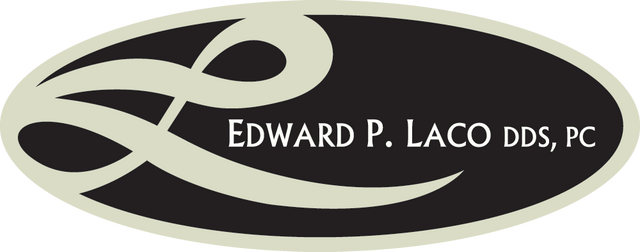TMJ/TMD Information
Edward P. Laco, DDS - 309 E. Riverside Blvd., Loves Park, IL 61111

To help diagnose a TMJ disorder, you want to look for the following symptoms that are generally related to TMD.
- Jaw Pain
- Jaw Clicking
- Limited Mouth Opening
- Jaw Locking
- Face Pain
- Eye Pain
- Ear Pain
- Neck Pain
If you are experiencing any of these symptoms, please call our office at 815-633-1815 and we'll be happy to discuss possible treatments that are available and would work best for you.
TMJ and TMD Symptoms and Treatment Overview
Do you ever experience a clicking or popping sound when opening or closing your mouth? Have you been suffering from headaches or migraines and no one seems to be able to help you? Have you been taking pain medicine for years and would like to get off of it? Do you feel any clogging or congestion in one or both of your ears? These are just a few of many symptoms that might be associated with TMD, or Temporomandibular Dysfunction, a common condition affecting the jaw joint or Temporomandibular Joint (TMJ).
TMJ dysfunction, often referred to as TMD, is a disharmony between the way the jaw joint works in an unstrained position and the way the teeth and bite work during those movements. Possible causes of this disharmony include tooth loss, accidents (like whiplash), mal-positioned and/or underdeveloped cranial or jawbones, and perhaps habits like clenching or teeth grinding. Many people go through life suffering from headaches and a variety of facial and neck pains without knowing the ultimate cause, which in many cases is TMJ disorder.
Define TMJ and TMD
They are the two joints which connect the lower jaw to the temporal bone at the side of the head. If you place your fingers just in front of your ears and open your mouth, you can feel the joint on each side of the head. Because these joints are flexible, the jaw can move smoothly up and down and side to side, enabling us to talk, chew and yawn. When the TMJ is not functioning normally and it is not within its physiological limits, it creates a condition called TMD, or Temporomandibular Dysfunction.
TMD is a group of conditions resulting from not having a normal function or "comfortable" positioning of the TMJ, and will present as a cycle of pain, muscle spasms and jaw problems. When teeth are missing, out of alignment, crowded or misshaped, chewing and biting cannot be achieved in a balanced way, so the TMJ and the muscles of chewing try to compensate for this unbalanced movement which results in symptoms that will confirm the presence of TMD.
Temporomandibular Joint Disorder (TMD) is not just a disorder, but a group of conditions, often painful, that affect the jaw joint or Temporomandibular Joint (TMJ) and the muscles that control chewing.
- Myofascial pain, the most common form of TMD, which is discomfort or pain in the muscles that control jaw functions and the neck and shoulder muscles.
- Internal derangement of the joint meaning a dislocated or displaced disc or injury to the condyle (the rounded part at the end of the jaw bone).
- Degenerative joint disease such as Osteoarthritis or Rheumatoid Arthritis in the jaw joint. Causes of TMJ/TMD
- Unbalanced occlusion or "Bad Bite"
- Stress (emotional or work/school related)
- Injury or trauma (this could have been an injury as obvious as a blow to the jaw with a fist or something as subtle as a whiplash injury with direct trauma to the head or jaw.
- Teeth grinding or Bruxism
- Missing teeth
- Crowded or "crooked" teeth
- Worn down teeth
- Old crowns and bridges
- Unbalanced dentures
When teeth are missing, or out of alignment, it causes the jaw to shift positions and the muscles to work harder to chew, swallow, bite...etc and eventually will cause: muscle spasms, tension and pain.
Muscle tension and misplaced TMJ could cause the TMJ disc to be pulled out of place which will result in pain, clicking and popping in the TMJ.
If the disc is displaced for a long time, the bones will start rubbing against each other and some damage will happen to the bone, this is called Osteoorthrosis.
If there is inflammation in other joints or bones of the body, it is called Osteoarthritis (Arthritis) which may involve the jaw bone and the TMJ. Some damage to the bone may be evident on the x-rays.
- Headaches, Migraines or tension headaches
- Worn or loose teeth
- Painful muscles in the neck and shoulders (muscle spasms)
- Pain behind the eyes.
- Clicking and popping of the jaw joint (TMJ)
- Locked jaw or restriction in opening or closing the mouth
- Earaches or a clogging feeling in the ears
TMJ Diagnosis
While recognizing TMJ problems is within the ability of most physicians and dentists, not all practitioners are qualified to diagnose it properly and treat it right. It is imperative that a trained practitioner in Craniofacial pain or Neuromuscular Dentistry give the final and definitive diagnosis, and suggest the most suitable treatment plan.
There is a lot of skepticism about TMJ treatment in the medical society, and that is simply due to the fact that physicians didn't receive the dental training and didn't acquire the knowledge required for such complicated diagnosis and treatment.
Undiagnosed TMJ/TMD
Many patients who suffer from TMD symptoms were never told that it is related to their TMJ problem and were not aware that treating their TMJ could easily relieve their suffering. To explain this further...
Headaches and Migraines
If you suffer from headaches or migraines, TMJ dysfunction could be the cause of your suffering. Once diagnosed, TMJ/TMD should be treated to relieve the headaches and migraines.
Ear congestion
Due to the proximity of TMJ to the ears, it is very common for the ears to feel congestion, or to have ringing in the ears when the TMJ bones move or dislocate from their place. In this case, ENT's (ear doctors) won't find anything wrong with the ears, yet the patients keep complaining about their ears. Once the TMJ is put back into its natural position, the pressure put on the ears will be relieved and the congestion disappears.

If you suffer from frequent head or facial pain, an incorrect bite may be the cause due to constant cranial muscle strain.
Headaches from dental stress are a type of muscle tension headache. A tension headache may be on one or both sides of your head and feels like a dull, non-throbbing ache that can usually be relieved by aspirin.
When you swallow, your upper and lower jaw muscles must hold your jaw firmly against the skull. Between swallowing over 2,000 times a day and a poorly aligned bite, the jaw muscles can overwork causing muscle strain which in turn leads to a headache.
People who suffer from migraine pain and chronic headaches clench their jaws in a balanced, centered position. This causes extremely intense muscular contraction, but little strain on the jaw.
Nighttime jaw clenching usually goes unnoticed but it sets the stage for migraine pain and chronic headache pain.
Edward P. Laco DDS, PC would love to meet you and your family and provide you with the dental care you need and give you all smiles you deserve! Our office provides the dental care you need to achieve the beautiful, natural look you seek. We can even reshape your natural teeth to make them straighter and more youthful. Our office is easily accessible and makes it convenient to those living near Loves Park to get the care they deserve.
Request An Appointment OnlineOr call us today at: 815-633-1815


